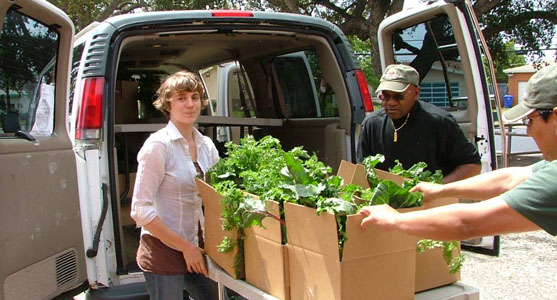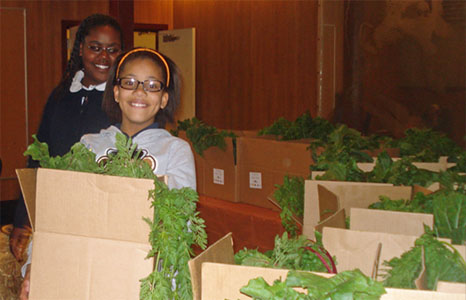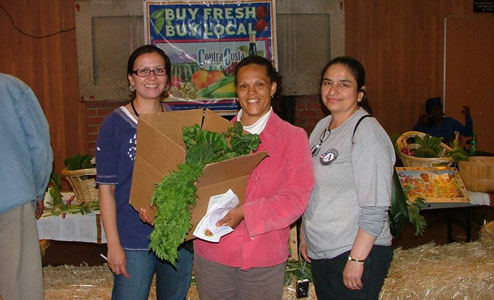Limited access to fresh produce is a challenge faced by residents of some urban communities like Richmond that are grappling with disproportionately high instances of obesity, particularly childhood obesity, and diet-related health issues such as diabetes and heart disease.

Thanks to an extended growing season, farms in Brentwood and nearby communities produce top-notch vegetables, including corn, kale, squash, string beans and asparagus along with the sweet and delicious stone fruits the region is best known for.
By Bill Picture
Published: October, 2013
Limited access to fresh produce is a challenge faced by residents of some urban communities like Richmond that are grappling with disproportionately high instances of obesity, particularly childhood obesity, and diet-related health issues such as diabetes and heart disease.
To address this issue, the Contra Costa County Board of Supervisors handpicked the Richmond Community Foundation (RCF) in 2008 to find a way to bring affordable, locally grown produce from farms in eastern Contra Costa County to dinner tables in western Contra Costa County as part of a pilot program. The result was Richmond Farm 2 Table, a collaboration of RCF, Contra Costa County, County Supervisor John Goya, EcoVillage Farm Learning Center and the Brentwood Agricultural Land Trust launched in 2009.
"Richmond was one of several areas in the west part of the county with neighborhoods identified as ‘food deserts,’ meaning there’s no supermarket or place to buy fresh fruit and vegetables," said Jim Becker, RCF’s vice president of community investments. "The irony was that a bounty of produce was being grown just 50 miles to the east."
While farms in Brentwood and nearby communities are perhaps best known for sweet and delicious stone fruits, the region’s agricultural repertoire also includes top-notch vegetables, including corn, kale, squash, string beans and asparagus, thanks to an extended growing season.
Under the Richmond Farm 2 Table program, an assortment of these locally grown goodies are packed into a box for pickup twice a month by subscribers to the program, who each pay $50 per month to enjoy the fruits of nearby farmers’ labor. To make it convenient for subscribers, Richmond Farm 2 Table has established pickup locations throughout the area, with varying hours to accommodate just about any schedule.
For more information on Richmond Farm 2 Table, visit www.urbantilth.org/csa/. All photos courtesy of Richmond Community Foundation.
Out-giving the competition
Richmond Farm 2 Table is not the only game in town, and it is competing for a share of the market with businesses whose fees include delivery to subscribers’ doors. What sets Richmond Farm 2 Table apart from the others is that a portion of each subscriber’s monthly fee helps subsidize a box of treats for a qualifying low-income household.
"Our goal from the beginning was to afford equal access to local, sustainably grown produce for everybody," Becker said. "So we asked ourselves, ‘How can we be competitive and offer this added social benefit?’ What we realized was that we could offer an even better box than the others at a comparable cost if we didn’t home-deliver. This way, subscribers get more than their money’s worth, more than $50 worth of really great produce."
To help Richmond Farm 2 Table meet its goal, several local farms generously offered their wares at discount prices. "Like Dwelley Farms out in Brentwood, they were big supporters," said Becker. "And Alhambra Valley Ranch in Martinez. This wasn’t just a chance to promote their business; they saw it as an opportunity to contribute something to the community."
Going local-er
The pilot program launched in 2009 with 100 households. A new-and-improved Richmond Farm 2 Table was launched in June 2013 with Richmond-based Urban Tilth in the driver’s seat. Urban Tilth is a non-profit organization promoting urban agriculture in western Contra Costa County. Urban Tilth currently oversees 11 small urban farms and gardens, and trains and employs residents from the farms’ host neighborhoods. Its goal is eventually to produce 5 percent of the local food supply.
"The pilot program worked; but there were some financial viability questions," Becker said. "We had to ask ourselves what could be done to make the program sustainable; and we realized that in order for it ever to be profitable, we needed a grower to be a part of the big picture."
In addition to managing the program’s day-to-day operation, Urban Tilth’s produce can be found in subscribers’ boxes, which further enhances sustainability. Chain-store-bought produce is often transported hundreds or even thousands of miles aboard greenhouse-gas emitting ships, trains and trucks. By minimizing the distance that Urban Tilth’s food travels, its environmental impact is reduced proportionately. "You can’t get more local that that," Becker said.
Under Urban Tilth’s direction, Richmond Farm 2 Table currently serves more than 300 households. The goal is to reach 500. "And we’ll get there," Becker said. "The new business model seems to be working; and I foresee a day when Urban Tilth can run this as a business, and we can step back."
But will they eat it?
Becker acknowledges that access alone won’t fix the area’s health woes, but rather that eating right is a behavior that needs to be developed and encouraged. So, for instance, putting a bushel of asparagus in someone’s hand doesn’t necessarily mean it will end up on their dinner plate.
"That’s why a big chunk of what we do is education," he said. "We teach people how to make healthy choices and try to help them understand why that’s important. Otherwise, the food just goes to waste."
To that end, Contra Costa County Healthy Services has offered cooking demonstrations as part of their partnership with Richmond Farm 2 Table, and Richmond Farm 2 Table has conducted tours of area farms. "It really helps, I think, for people to have a relationship with their food—to see where it comes from, learn how it’s grown and talk to the people who grow it," Becker said. "When the food on your plate has a story, it actually makes it a little more special."

To make it convenient for subscribers, Richmond Farm 2 Table established pickup locations throughout the area, with varying hours to accommodate just about any schedule.

Under the Richmond Farm 2 Table program, an assortment of locally grown goodies are packed into a box for pickup twice a month by subscribers to the program, who each pay $50 per month to enjoy the fruits of nearby farmersí labor.

